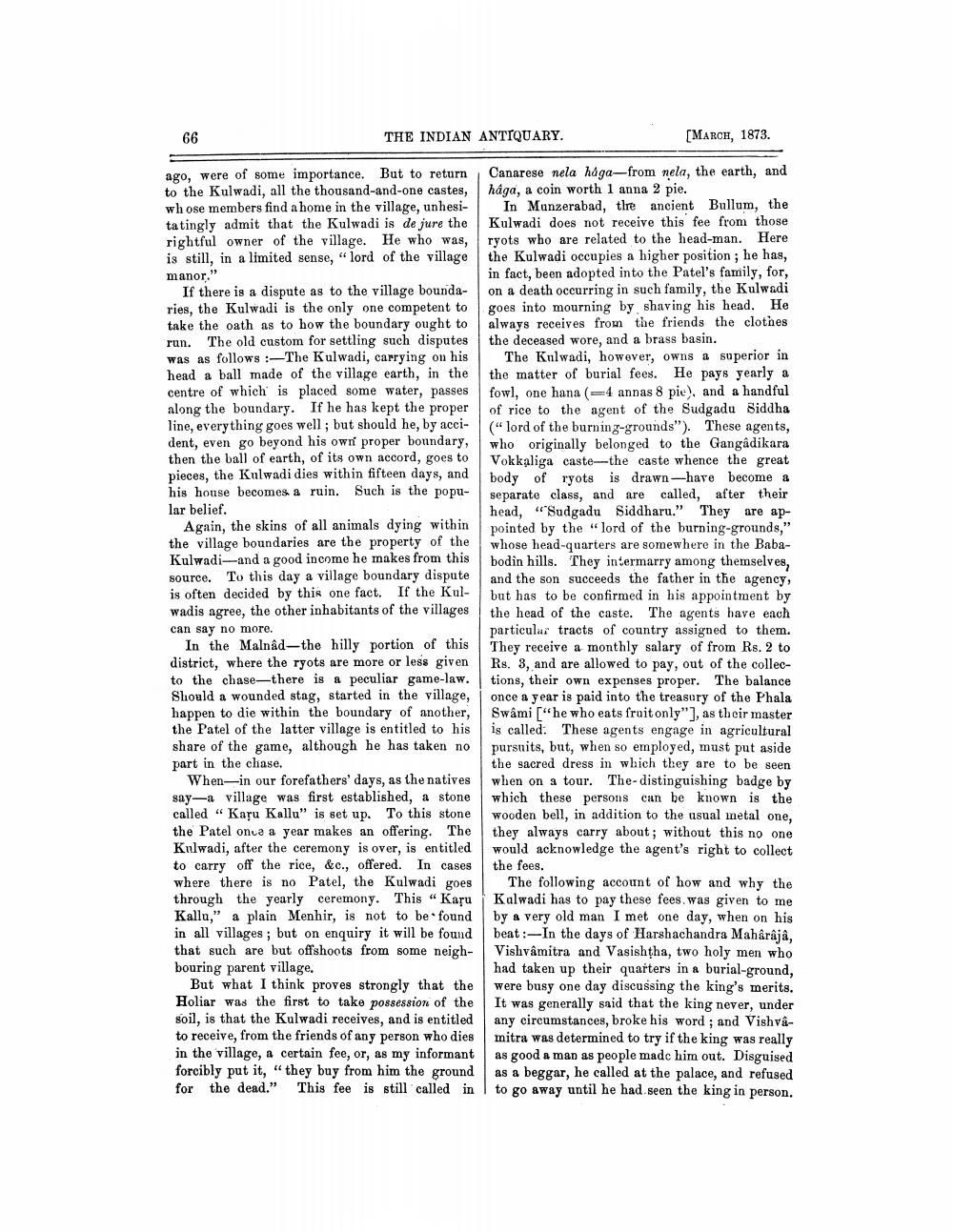________________
66
THE INDIAN ANTIQUARY.
[MARCH, 1873.
ago, were of some importance. But to return to the Kulwadi, all the thousand-and-one castes, whose members find a home in the village, unhesitatingly admit that the Kulwadi is de jure the rightful owner of the village. He who was, is still, in a limited sense, " lord of the village manor."
If there is a dispute as to the village boundaries, the Kulwadi is the only one competent to take the oath as to how the boundary ought to run. The old custom for settling such disputes was as follows :-The Kulwadi, carrying on his head a ball made of the village earth, in the centre of which is placed some water, passes along the boundary. If he has kept the proper line, everything goes well; but should he, by accident, even go beyond his own proper boundary, then the ball of earth, of its own accord, goes to pieces, the Kulwadi dies within fifteen days, and his house becomes a ruin. Such is the popu
ich is the popu- lar belief.
Again, the skins of all animals dying within the village boundaries are the property of the Kulwadi--and a good income he makes from this source. To this day a village boundary dispute is often decided by this one fact. If the Kulwadis agree, the other inhabitants of the villages can say no more.
In the Malnad - the hilly portion of this district, where the ryots are more or less given to the chase-there is a peculiar game-law. Should a wounded stag, started in the village, happen to die within the boundary of another, the Patel of the latter village is entitled to his share of the game, although he has taken no part in the chase.
When—in our forefathers' days, as the natives say-a village was first established, a stone called “Karu Kallu" is set up. To this stone the Patel onva a year makes an offering. The Kulwadi, after the ceremony is over, is entitled to carry off the rice, &c., offered. In cases where there is no Patel, the Kulwadi goes through the yearly ceremony. This “Kau Kallu," a plain Menhir, is not to be found in all villages; but on enquiry it will be found that such are but offshoots from some neighbouring parent village.
But what I think proves strongly that the Holiar was the first to take possession of the soil, is that the Kulwadi receives, and is entitled to receive, from the friends of any person who dies in the village, a certain fee, or, as my informant forcibly put it, "they buy from him the ground for the dead." This fee is still called in
Canarese nela haga-from nela, the earth, and hága, a coin worth 1 anna 2 pie.
In Munzerabad, tire ancient Bullum, the Kulwadi does not receive this fee from those ryots who are related to the head-man. Here the Kulwadi occupies a higher position; he has, in fact, been adopted into the Patel's family, for, on a death occurring in such family, the Kulwadi goes into mourning by shaving his head. He always receives from the friends the clothes the deceased wore, and a brass basin.
The Kulwadi, however, owns a superior in the matter of burial fees. He pays yearly a fowl, one hana (4 annas 8 pie), and a handful of rice to the agent of the Sudgadu Siddha (" lord of the burning-grounds"). These agents, who originally belonged to the Gangâdikara Vokkaliga caste--the caste whence the great body of ryots is drawn-have become a separate class, and are called, after their head, "Sudgadu Siddharu." They are appointed by the lord of the burning-grounds," whose head-quarters are somewhere in the Bababodin hills. They intermarry among themselves, and the son succeeds the father in the agency, but has to be confirmed in his appointment by the head of the caste. The agents have each particular tracts of country assigned to them. They receive a monthly salary of from Rs. 2 to Rs. 3, and are allowed to pay, out of the collections, their own expenses proper. The balance once a year is paid into the treasury of the Phala Swami["he who eats fruit only"), as their master is called. These agents engage in agricultural pursuits, but, when so employed, must put aside the sacred dress in which they are to be seen when on a tour. The distinguishing badge by which these persons can be known is the wooden bell, in addition to the usual metal one, they always carry about; without this no one would acknowledge the agent's right to collect the fees.
The following account of how and why the Kalwadi has to pay these fees was given to me by a very old man I met one day, when on his beat:- In the days of Harshachandra Mahârâjâ, Vishvamitra and Vasishtha, two holy men who had taken up their quarters in a burial-ground, were busy one day discussing the king's merits, It was generally said that the king never, under any circumstances, broke his word ; and Vishvamitra was determined to try if the king was really as good a man as people made him out. Disguised as a beggar, he called at the palace, and refused to go away until he had seen the king in person.




